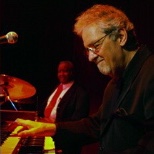Home » Jazz Articles » Album Review » Nancy Reed & Spencer Reed: Happying
Nancy Reed & Spencer Reed: Happying
What brought Nancy and Spencer to town were fulltime gigs at the resorts, playing dances and shows. Spencer's first job was on drums at Tamiment, while—a few years later—Nancy assumed the position of bandleader at The Hillside Inn. Founded in the 1950s, The Hillside catered to African Americans and Jews who were denied access to some of the other local resorts. The Reeds have remained in the area since, forming their first duo together in 1977, then performing in tandem and separately for virtually all the regional venues and releasing some dozen albums, their work admired by jazz fans and musical colleagues alike. Happying presents material from previously unreleased sessions, a few of which Spencer recorded on a Tascam 8-track cassette recorder back in the early 1980s.
"Cheerful Little Earful," the delightful album opener, features multiple generations of Pocono players, Goodwin—the august elder—at the drums, Jay Rattman—the youngest member—on alto saxophone, with the Reeds—situated generationally in between—singing and playing. A lesser-known tune by Harry Warren with lyric by Ira Gershwin and Billy Rose, it was written for the Broadway musical Sweet and Low (1930), starring Fanny Brice.
"Feel Like Makin' Love" is another standout track, capturing a warm breeze and a popular era. The tune was a huge hit for Roberta Flack (Feel Like Makin' Love, Atlantic, 1974). Shortly thereafter, it became a standard of the day, with versions in rapid succession from Johnny Mathis (The Heart of a Woman, Jon Mat Records, 1974), Lou Rawls (She's Gone, Arista, 1974), Marlena Shaw (Who Is This Bitch Anyway, Blue Note, 1975), Gladys Knight & The Pips (2nd Anniversary, Buddah, 1975), among others. The piece was written by singer-songwriter Eugene McDaniels, whose "Compared to What" was also an early hit for Flack (First Take, Atlantic 1969) and an even bigger one for Les McCann and Eddie Harris that same year (Swiss Movement, Atlantic). The Reeds' version has an authentic period feel and groove—cooled down just a notch from the Flack original—with a perfect sprinkling of synthesizer stardust from keyboardist Peter Philips' Yamaha DX7. Nancy Reed's singing is—as always—gorgeous, subtly expressive, pitch perfect and effortlessly swinging.
Nancy's superb vocal and a lovely solo from Liebman on soprano saxophone make Robert Lamm's "Does Anybody Really Know What Time It Is" a highlight of the album. (Check YouTube, bottom of this page.) The arrangement expands on a little 5/8 passage from the intro of the original release (Chicago Transit Authority, Columbia Records, 1969), the self-titled debut album of the popular jazz-rock group now known as Chicago. Whimsically, the Reeds recast the entire piece in a meter of 5, with Nancy's voice floating gracefully over the time as she articulates the meter with her bass beneath. The piece culminates in a freewheeling group improvisation with vocal overdubs from Nancy, and Spencer joining in on percussion.
Spencer unleashes his rocking guitar on the closing tune, Joseph (Flip) Nuñez's "Happying," the album's title track, which sums up a vibe the Reeds bring to their dates in the Poconos and elsewhere. Their buttery vocal blend, instrumental prowess and manifest joy in performing continue to sustain a musical partnership that has become synonymous with the best in homegrown Pocono jazz for nearly 50 years.
Track Listing
Cheerful Little Earful; Whisper Not; Does Anybody Really Know What Time It Is; A Child Is Born; Feel Like Makin' Love; Morning Morgantown; Moanin'; Happying.
Personnel
Nancy Reed
bass and vocalsSpencer Reed
guitar and vocalsBill Goodwin
drumsDave Liebman
saxophoneJay Rattman
saxophoneCraig Kastelnik
organ, Hammond B3Additional Instrumentation
Peter Philips: synthesizer (5); Ed Ludwig: tenor saxophone (8); Neil Braunstein: drums (5).
Album information
Title: Happying | Year Released: 2024 | Record Label: Self Produced
Tags
PREVIOUS / NEXT
Support All About Jazz
 All About Jazz has been a pillar of jazz since 1995, championing it as an art form and, more importantly, supporting the musicians who make it. Our enduring commitment has made "AAJ" one of the most culturally important websites of its kind, read by hundreds of thousands of fans, musicians and industry figures every month.
All About Jazz has been a pillar of jazz since 1995, championing it as an art form and, more importantly, supporting the musicians who make it. Our enduring commitment has made "AAJ" one of the most culturally important websites of its kind, read by hundreds of thousands of fans, musicians and industry figures every month.


























